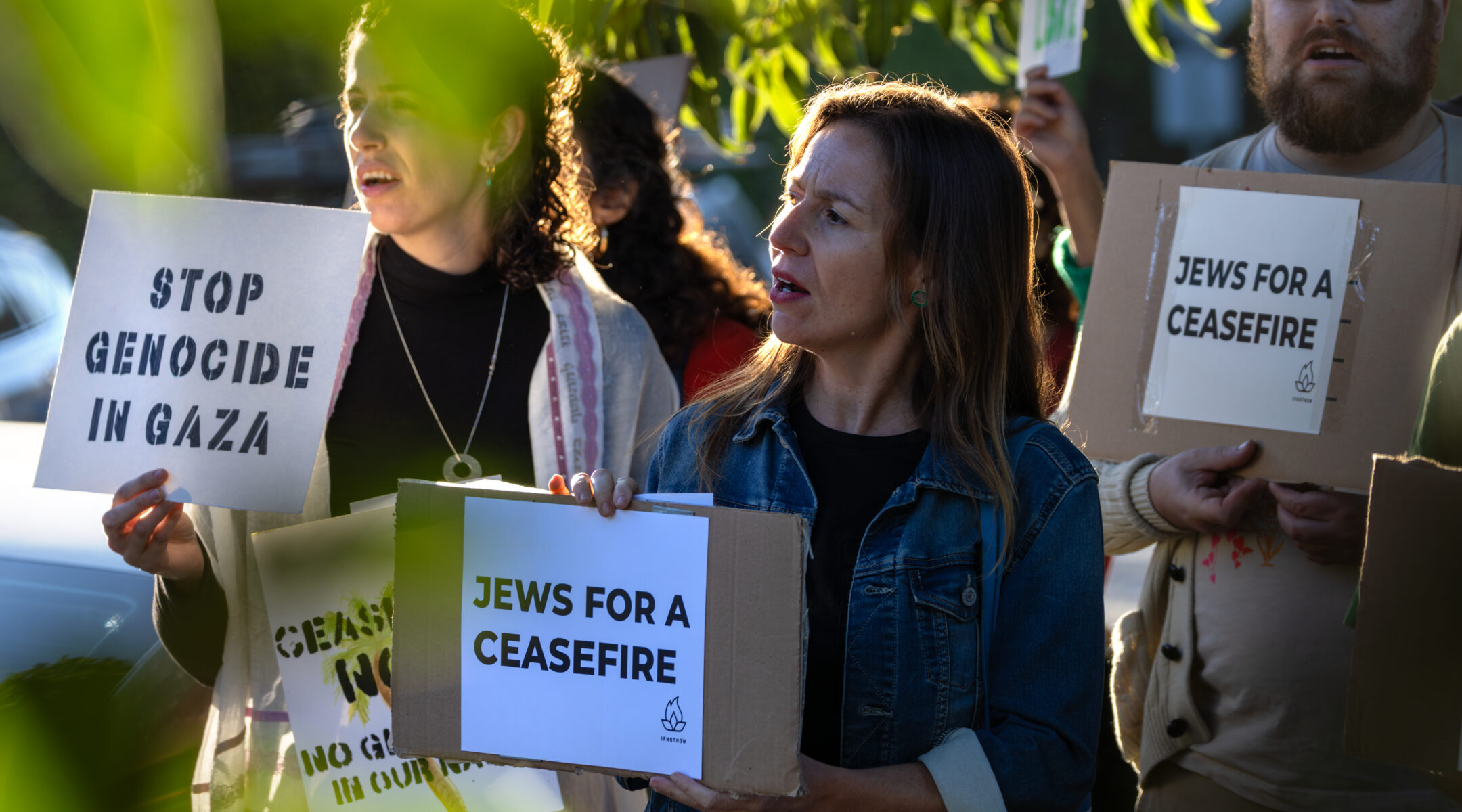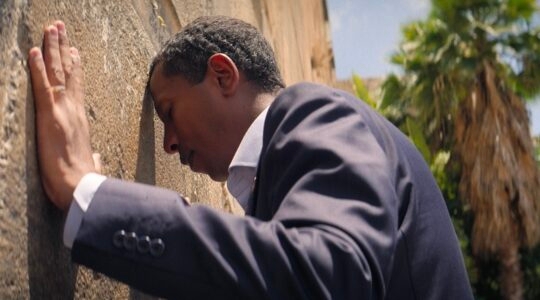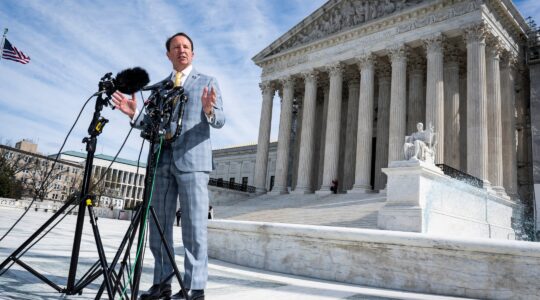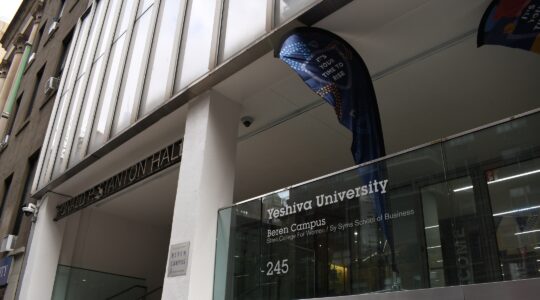(JTA) — When the Jewish group IfNotNow asked educator and musician Shoshana Jedwab whether it could include her song “Where You Go” in its songbook, Jedwab offered a cautious yes.
The year was 2018, and the song, which Jedwab had officially released on the first anniversary of then-President Donald Trump’s travel ban on Muslim-majority countries, had taken off at progressive protests.
The lyrics were easily adaptable to the most pressing issues of the moment, including immigration, women’s rights and Indigenous rights — all issues that IfNotNow, which had been founded in 2014 to press American Jews to more harshly criticize Israel, was widening its scope to tackle. Jedwab knew that IfNotNow was further to the left on Israel issues than she was, but she decided to grant permission nonetheless.
“I thought, ‘I need to open up, I need to be braver, I need to reach out here and give my blessing to people who put energy into the anti-occupation movement,” she said. “I had my father ringing in my ears, a Holocaust survivor and an ex-Palmachnik who looked at the occupation in the West Bank and said this is a shame, this is a shanda, we cannot be occupiers. So that’s why I did it.”
Five years later, Jedwab has changed her mind. She recently asked IfNotNow to remove “Where You Go” from its literature. The trigger for that reversal, she said, was the group’s claim that Israel is committing a “genocide” in its war against Hamas in Gaza. Some protests trumpeting that accusation have also featured her song.
“I gave them permission. I trusted them,” she told the Jewish Telegraphic Agency. “It breaks my heart thinking that this organization that thinks it’s doing good is putting Jews in danger by saying a falsehood, an incredibly dangerous falsehood.”
Jedwab isn’t the only Jewish musician to demand that IfNotNow stop using their songs in the wake of Hamas’ Oct. 7 attack on Israel that killed 1,400 people, took hundreds hostage and began the current war.
Rabbi Menachem Creditor declared on social media over the weekend that he disavows the group’s use of his song “Olam Chesed Yibaneh,” citing its genocide accusation and its alignment with Jewish Voice for Peace, an explicitly anti-Zionist group.
“I’ve been struggling for a long time with the use of my song by IfNotNow and wanted to give them every chance to express themselves with different Jewish eyes,” Creditor told JTA. “But again and again, they have effectively unmoored themselves from our people and are acting in ways that will be destructive to the Jewish people and to the State of Israel.”
In asking IfNotNow to stop using their work, the musicians are taking a page from the likes of Sting, Bruce Springsteen and R.E.M., all of which have barred politicians from playing their songs at rallies.
The Jewish musicians are also opening a window into a dramatic reordering within the progressive Jewish left since Oct. 7, as some progressive Jews have realized that despite sharing an outlook with the members of far-left Jewish groups on many social issues, their differences of opinion on Israel now feel like an uncrossable gap.
IfNotNow represents a notable laboratory for those tensions because of its posture at the intersection of Jewish expression and progressive politics. The group was founded during the last major war in Gaza by young Jews who said they were dissatisfied with what they had learned about Israel at their Jewish day schools and summer camps. Its activities have long drawn on and featured Jewish ritual and objects.
Like Jedwab, Creditor, now the rabbi in residence at UJA-Federation of New York, had expressed admiration about IfNotNow’s use of his work in the past, even if he did not endorse its outlook on Israel. In 2016, he said on Facebook that he was inspired by the group as it protested against Trump’s appointment of Steve Bannon, previously the chair of the hardline right-wing news site Breitbart, as chief strategist.
“That their live streamed marching on the Republican party offices in Boston had them singing my ‘Olam Chesed Yibaneh’ is, perhaps, most humbling of all,” he wrote at the time. The song’s title means “The World Is Built on Kindness” and is drawn from Psalm 89.
In addition to “Olam Chesed Yibaneh” and “Where You Go,” IfNotNow also recites the Mourner’s Kaddish prayer and sings traditional Jewish songs such as “Lo Yisa Goy,” based on a Biblical passage with an antiwar message, at its rallies. Other actions have featured Jewish prayer shawls or the shofar.
“Turning to ritual and song is one of the most basic, ancient things that Jews do,” said Ilana Lerman, who helped compile the IfNotNow songbook that features Jedwab’s song. “This is a very ancient and brilliant technology: We use song and ritual to call people, to mourn, to praise, to act, to join in solidarity, to learn, to mark time. These are all things that we are going to want to do as a movement together.”
IfNotNow told Jedwab that it would remove her song from its literature in the future, said the songwriter, who also teaches Jewish studies at the Abraham Joshua Heschel School in New York City. But she said friends have let her know that “Where You Go” is still being sung at the group’s rallies. And the group’s national spokesperson, Eva Borgwardt, declined on Sunday to answer questions about whether it plans to curb the singing of “Olam Chesed Yibaneh,” which Creditor wrote after 9/11.
“We want to build a world of love and peace, where no Palestinians or Israelis need to fear for their lives. We cannot build a world of love through more bombing and death,” Borgwardt said in a statement.
“We will continue to call for ceasefire, the release of all hostages, deescalation, and addressing the root causes that brought us here, and we are proud to draw on the rich Jewish tradition that gave us the words of Psalm 89:3,” she added.
Lerman said on Tuesday that her understanding was that the group would in fact stop using Jedwab’s and Creditor’s songs in its national actions. But she said it could take some time for the songs to disappear completely — because they have been such mainstays of IfNotNow’s activism up to this point, and it might take some time for local chapters to get the message.
“We’re definitely going to follow their request,” she said. “We won’t sing their music, and we’re really sad about it, because the messages from their music really come from the part of Judaism that is about love and not about vengeance.”
Creditor said he had gotten offers of pro-bono legal assistance to press IfNotNow to carry out his request, but he isn’t interested.
“I think that gives too much oxygen where I just simply want them to stop,” he said. “If they have spiritual integrity, they’ll respect my wishes.”
Some critics of IfNotNow and Jewish Voice for Peace have gone much further, announcing in recent weeks that they no longer consider the groups’ members to be Jewish. Avi Mayer, the editor of the Jerusalem Post, said as much in a column last week, quoting a Oct. 27 thread on X, the platform formerly known as Twitter, by Dan Elbaum, the North American head of the Jewish Agency for Israel.
Saying that he was “talking about American Jews who call Israelis Nazis and accuse them of acts of genocide — knowing full well and even relishing the hurtfulness of those terms,” Elbaum specifically called out members of IfNotNow and Jewish Voice for Peace.
“I have reached a sad conclusion. As much as I would not like to give up on a single Jew, I have given up on them. For me, they are deserving of “cherem” (formal exclusion from the Jewish people),” Elbaum wrote, adding, “Unlike Hamas who would have joyously murdered them on October 7, I do not consider them Jews.”
Creditor shared Elbaum’s thread, writing, “I grieve as I add my amen to this sad but necessary conclusion.” But he told JTA that he would not actually go as far as Elbaum or Mayer.
“I’ll make a delineation between IfNotNow and the individuals who are caught up in it,” he said. “I’m not willing to say they’re not Jewish. But what they are doing is anti-Jewish.”
That kind of thinking is an “an unfortunate pattern” that has emerged in this moment of political realignment, said Rabbi Miriam Grossman of Brooklyn’s Kolot Chayeinu synagogue, who has participated in IfNotNow rallies.
“Jewish leaders, sometimes rabbis and sometimes organizations, are saying that various elements of Jewish life are no longer usable or fair game anymore in the hands of Jewish folks who are organizing and calling for ceasefire,” she said.
“As a rabbi, I just want to publicly disagree with that,” Grossman said, adding about IfNotNow protesters, “They’re so clear that they’re proud of their Judaism. They want to show up in Jewish community and to fight for life together. … And so it just makes me sad when people are looking at that and saying that it’s not Jewish.”
Rallies in support of Israel and its response to Oct. 7 have also featured Jewish songs — most frequently “Am Yisrael Chai,” written by Shlomo Carlebach in 1965 for the movement to free Soviet Jewry. (Creditor is married to Carlebach’s daughter Neshama, herself a Jewish songwriter who has performed “Olam Chesed Yibaneh” in venues as varied as Auschwitz, Japan and a memorial concert for her father.)
Both Creditor and Jedwab said they recognized they could not put their songs back in the bottle.
“I’m not asking people not to sing it. I believe that people’s hearts are basically good,” Jedwab said about “Where You Go.” “But I cannot condone that organization using my song officially.”
“It’s hard to control the use of your art when it’s already been created,” Creditor said. “But it hurts me the worst when I see my song weaponized against my own family’s heart.”
And Lerman said that even as “Olam Chesed Yibaneh” and “Where You Go” recede, other songs will fill their place.
At each protest, she said, some IfNotNow members are deputized as song leaders — including 40 at the recent protest at the U.S. Capitol where many demonstrators were arrested. Their goal, she said, is to keep the singing going for as long as the rally lasts.
“We Rise,” a newer song by the musician Batya Levine, has been a feature of Jewish Voice for Peace and IfNotNow rallies, and was sung in the rotunda of the Capitol. (Levine, who has taught the song at JVP events, did not respond to a JTA request for comment.) And “Ceasefire Now,” a two-word song by Sol Weiss, has also gained traction over the last month.
“New music is born inside of moments that call for new music,” Lerman said.
JTA has documented Jewish history in real-time for over a century. Keep our journalism strong by joining us in supporting independent, award-winning reporting.






